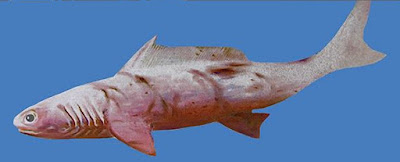Researchers on an Australian exploration ship got more than they bargained for when they searched an area near Sydney in New South Wales. They were examining lobster larvae but discovered something really snappy. On the sea floor near ancient volcanoes they found an odd fanged fish.
The tiny fish a bit larger than your thumbnail is as black as coal. While the fish has probably already been named in the snaggletooth dragonfish genus (Astronesthes) these fish have rarely been seen. There are ten fish species of this type located in the region. Further analysis will be need to find out if it is a new species.
The larvae of common fish such as flatfish, gurnard, kingie and Dolphin fish were also seen there. This surprised scientists who had previously thought that they were washed into the path of predators by the current. It seems the dragon fish came up from the depths to join them.
♣
◆ Biology by Ty Buchanan ◆
●
















